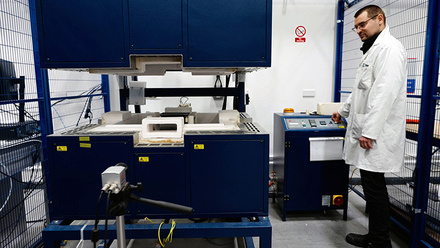Making the UK quantum ready
Shardell Joseph reports on an online forum that delved into developing, commercialising and standardising quantum technology in the UK.

In 2013, the UK Government committed to investing £270mln in quantum technology research – in just under 10 years, the government has now invested around £1bln. According to the Department for Business, Energy & Industrial Strategy (BEIS), this investment has secured the nation’s status as a ‘world-leader in quantum science technologies’.
Reflecting on the progress so far, Sir Peter Knight, Chair of the UK National Quantum Technology Programme Strategic Advisory Board, spoke at a recent Westminster Policy Forum on ‘Developing quantum technologies in the UK’. He said, ‘In a 10-year period, what we've done through combinations of activities, is generate a £1bln programme, which is a huge investment in what is a disruptive technology.
‘We see a number of places that are really emulating the way that we've linked together through structures in entrepreneurship in quantum artificial intelligence – a recent external survey has revealed that we’re the top country in Europe for accumulated funding and the top country in Europe for start-ups, which is really interesting.’
The first phase of the National Quantum Technologies Programme (2014-19) ran for five years to establish a new sector for future quantum information technologies in the UK. The initial programme focused on sensors and metrology, imaging, secure communication, and q computing and simulation.
‘That identified what we could do to really accelerate the programme into a delivery phase,’ Knight noted. ‘And…enabled us to move on…to a much stronger commitment by government.’
Entering the second phase in 2019, government and industry is further investing to advance quantum science and demonstrator platforms and seeks to embed them into a broad range of industries.
Knight said, ‘I've been calling this a quantum alliance – an alliance of academia with researchers looking at scientific knowledge, to share breakthroughs [with] government, which have their own ability to carry out really ground-breaking research. But also, our role as early adopters. And then industry – identifying market opportunities and linking the development programmes with a strong research base.’
Organisations playing vital roles to advance quantum in the UK include UK Research and Innovation (UKRI), Innovate UK, BEIS, the Engineering and Physical Sciences Research Council, the Knowledge Transfer Network, the Defence Science and Technology Laboratory, the National Physical Laboratory and the National Cyber Security Centre.
Described as a major development in the process, the National Quantum Computing Centre, located at Harwell Campus in Oxfordshire, UK, opened in 2020, with a total investment of just under £100mln.
Knight continued, ‘And we haven't neglected international collaboration. We have a formal link with Singapore via our Science and Technology Facilities Council collaborators. We have a really interesting collaboration with Canada…we're looking at opportunities with Australia as well, and...the United States.’
Preparing for roll-out
R&D is propelling quantum development in the UK, but Roger McKinlay, Challenge Director of Quantum Technologies at UKRI, said the entire ecosystem must be considered, putting in place a variety of steps towards market roll-out.
‘There's a lot of talk in early technology. Of course, you think of the physical prototype, or in industry we used to call it the cardboard box of wires hanging out – good ideas coming out of labs and universities.
‘But of course, it never starts that simply – a hardware comes from hardware companies, you need to be able to handle materials, you need to have the skills, you need to be able to build components, you need to invest in plants, you need processes, you need facilities.
‘And at the end of the day, you have to be brave enough to ship a product and get someone to pay for it, probably even have to stick a CE marking on it in some places. So, there's quite a complex story there, which is about having the right industry, not just about having the right prototypes.’
Recognising the potential threats that could come with commercialising quantum, Knight emphasised the importance of preparing for a ‘quantum-ready economy’.
He said, ‘Were we to build a quantum machine, that exponential difficulty changes to polynomial. And it means that basically, our entire infrastructure depends on that security – the internet has to be replaced, [and] a quantum-ready economy has to roll-out a quantum resilient method of doing encryption and internet security.’
According to Knight, a large-scale quantum attack through quantum computing is around 10-15 years away. ‘We did initially identify a one-in-seven chance of all the crypto primitives being affected by quantum attacks by 2026 – and a one-in-two chance by 2031.
‘And that means that we really have to engineer this quantum resilient economy. At the same time, we're developing all the opportunities that quantum computing brings for us.’
Premature standards?
Another area of focus is implementing standards. ‘The UK must put in place the necessary practices and environments to be recognised as a leading nation for developing quantum technologies,’ the UK National Quantum Technology Programme roadmap reads.
The push for standards before the quantum technology is ready, however, could have a negative impact on commercialisation, according to Dr Carl J Williams, of the National Institute of Standards and Technology, USA.
‘Canada, the UK and the US already had several interactions around future quantum standards…And so there's a lot of activity going on in this area [of] standard development…sustaining development organisations are moving into this area quite actively, and in some cases, very prematurely.
‘You can look at standards by looking at technical readiness levels, and a lot of the quantum technologies are at very, very low levels. So, it's really premature to be pushing certain types of standards at this moment, because we'll make unwise decisions. And often, if you make early decisions, they also give unfair political market advantage.
‘Do we really actually know what the architecture of a general-purpose quantum computer could look like? No, we don't. Do we know what the interface standards are? No, I don't think we do. The problem is at the moment, there are some countries pushing quite aggressively to increase the amount of standardisation and it's probably premature and requiring us to put in a lot of resources and time to do this.’
Looking towards phase 2 and beyond, Knight concluded, ‘I think we have a very successful programme that is widely admired around the world and emulated. It builds on the great science that we already identified through external review in the UK, [now] the attempt is to reap economic benefit from that investment and that talent.’
The UK's push to become quantum-ready
£93mln has been invested in under 10 years across four key work streams:
- NISQ demonstrator hardware platforms
- Software, algorithm and applications
- High performance, scalable qubit technology
- Roadmap towards universal fault-tolerant quantum computing







